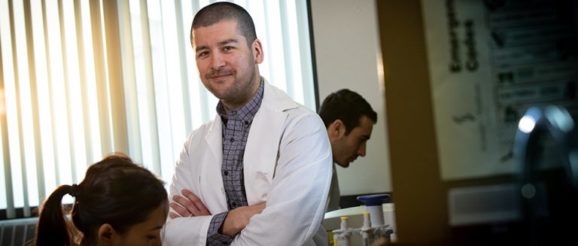Innovation Showcase researchers spotlight: Jeremy Hirota – Daily News

Since 2008, the McMaster Innovation Showcase has raised awareness of McMaster’s role in helping local businesses and economies grow. Hosted by the McMaster Industry Liaison Office, the event includes keynote speakers, panel discussions, open houses at entrepreneurship hubs and more.
Along with highlighting McMaster’s research, the Innovation Showcase also builds and strengthens private-public sector partnerships, and provides a venue for local business leaders and government officials to learn more about the university’s facilities and technology.
Jeremy Hirota is one of the researchers who will be showcasing their work at this year’s event.
On his research and what he likes about it
I’m a lung immunologist interested in asthma, Chronic Obstructive Pulmonary Disease (COPD), and cystic fibrosis. Currently the traditional way of doing lung research is through in-vitro models, in-vivo models, and clinical samples. My goal is to move into more cutting-edge methods of research specifically using 3-D printing to study how cells grow in realistic conditions.
I think there can be misconceptions about research. There’s an art and creative aspect to it. Trying to understand the problem and then understand the constraints in order to design a way to address the problem takes creativity in order to come up with a solution that does not already exist.
On how he got into his area of research
I did my undergraduate degree at McMaster and my first co-op placement was at the Firestone Institute for Respiratory Health with Dr. Mark Inman. He defined the point where I decided to go into research. He taught me about having different frames of reference when thinking about how to solve a problem. That introduction to biomedical research and working with a drug company made me realize I could make a difference.
On the challenge of bringing research into the “real world”
The challenge is that not everything I do can go into the real world and the work that does could take ten years to get there. Instead I work to communicate the work that is being done and translating it to the public. I also help create companies or commercialization opportunities from the research that we’re doing.
On failure
In order to get funding for research we need to apply for grants. Not all grants are mature enough or feasible enough to receive funding. Getting rejected for funding is part of research. You need to persevere, be positive, and constructive. The most recent grant I received was after three attempts. Failure is part of what you need to do in this field. You need to be your biggest champion and focus on the good and hope that somebody else recognizes that good and sees the value in it.
On the next generation
It’s important that we mentor the next generation, and support their creativity and entrepreneurial mindset. We also need to help them feel comfortable taking risks. My hope is that this creates a culture change where we’ll have a massive pool of innovative thinkers in society.
